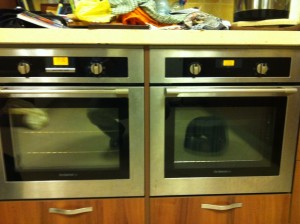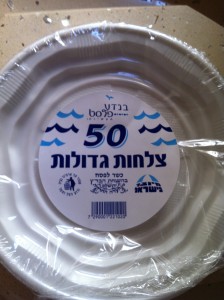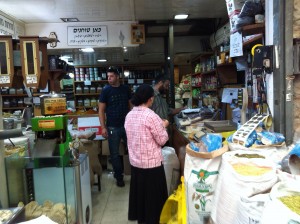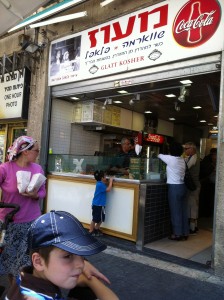I was very pleased with myself that I already knew my way around the Rova (Jewish Quarter = “Rova Yehudi” = “Rova” for short) pretty well when we got here. Having had virtually no sleep in a full day prior to our late night arrival, it didn’t take too long to get over jet lag, either. We spent the time before the beginning of the zman (school term) buying housewares, setting up services like cell phones and home broadband, and otherwise getting settled.
Learning to use our appliances has been a humbling experience. E.g., we discovered that we do have a dishwasher, which we plan to use sparingly, but I’m embarrassed to say how long it took us to figure out where to put the detergent. Not to mention how long it took to figure out which product at the makolet (sort of a mini-mart; somewhere between a convenience store & a real grocery store) was dishwasher detergent. We still don’t know how to use the ovens. Other surprises:
- The lighted switch near the front hall turns on & off our doorbell.
- The older Shabbos water urn leaks… big time!
- Our stoves have a weird safety mechanism that made it impossible to light them until our neighbor showed us how.
- Our shower head needed to be soaked in vinegar to clear out the calcium deposits from the very hard water here.
- There’s a Shabbos timer for most of the common area lights built into the circuit breaker.
Going around town shopping for housewares is… how shall I put this? … not the kids’ favorite thing in the world to do. Dragging them from mall to shuk to storefront was not the most fun thing we’ve ever done as a family. We tried bribery, like the cheesy rides at the mall and treats of all kinds. On our trip to the shuk (market) at Machane Yehuda, Debbie had the excellent idea to put on a scavenger hunt. She made a list of things to find there, of which the boys could take digital pics. The plan backfired when it devolved into crying fits over the composition of teams, and who was taking some sort of unfair competitive advantage.

Another thing you don’t see at home: a synagogue inside the mall. With a 400-year-old Italian Ark, to boot.
We eventually accumulated pretty much everything we need. A few observations along the way:
- The stuff here is typically not as nice as in the U.S. On the other hand, it is generally cheaper.
- There’s a massive difference in quality when it comes to paper, plastic, and textile items. The disposable plastic plates here you can see through. Paper napkins are actually hard to find in U.S.-style quantities, and they are markedly thinner and more expensive. Plastic cups are small and flimsy – the ubiquitous red Solo cup of American party fame is nowhere to be found here.
- Many local kitchen towels do not actually absorb liquid. This seems like an odd quality for a towel to lack.
- We have yet to find any American-style sponges or washcloths.
- When it comes to customer service, e.g.dealing with the phone company, I’ve found it to be surprisingly personable, but often incompetent — sometimes astonishingly so — and maddeningly inconsistent. For example, I spent a long time at the Orange store setting up our cell phones. The people there couldn’t have been nicer, and worked extensively with me to get my service set up. But when I walked out, I discovered that the data plans on our phones had not been activated. I went back and got that taken care of, only to discover later that international calls on our phones were blocked (despite having purchased all-inclusive plans with free international calls). I later called Orange to have my voicemail system language changed to English (thanks to a tip from a neighbor that this could be done), and the super-friendly English-speaking rep did it for me instantly. When I called back later to get Debbie’s done, I was told by a different rep that she could not do it, and Debbie would have to call a different number from her phone. The Bezeq (phone company) rep called me when she was supposed to in order to set up our home internet; she already had my name, knew I spoke only English, and even gave me her personal cell phone number. But I had to tell her multiple times that the address they had for us was wrong, and only later discovered that there were a number of previously-undisclosed additional steps that had to be done to effectuate service.
- Cell phone service is way cheaper here. We’re paying about $35 per phone to get unlimited minutes, texts, international calls (!), and 1G of data per month (and once you hit the limit, it neither stops nor charges you extra – the download speed just slows down).
There’s always more stuff to get, but the major shopping is done, and we hope we can focus on the reasons we’re here. With so much to do, it is easy to get the idea that getting settled is our principal focus, and to forget the real mission. Time to aim a little higher.





